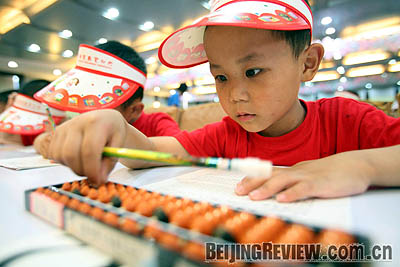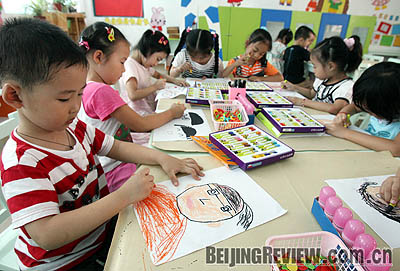|
 YOUNG MINDS: Children from Taizhou City, Jiangsu Province, take part in an abacus calculation competition. Many kindergartens offer extra classes in subjects like mathematics, for a fee
YOUNG MINDS: Children from Taizhou City, Jiangsu Province, take part in an abacus calculation competition. Many kindergartens offer extra classes in subjects like mathematics, for a fee
"Even if Yunyun were accepted by Peking or Oxford University in the future, I might not be so excited," said Wei Lunsi.
Yunyun is Wei's three-year-old son and was just accepted by a public kindergarten in Beijing. One of the conditions to be accepted is that the family had to pay 30,000 yuan ($4,386) as a sponsorship fee to the kindergarten.
Although there are some government documents to regulate kindergarten charges, some kindergartens still charge extra fees. Except for the set fee of 700 yuan ($103) per month, extra fees vary from several thousands to tens of thousands.
"I didn't hesitate to pay the sponsorship fee, which allows my son enter this kindergarten and have a good start in life," said Wei. Wei and her husband's combined annual income is 220,000 yuan ($32,195), which is relatively high. They gave up on another better kindergarten, which asked for 50,000 yuan ($7,317). "That was quite unreasonable," said Wei.
Wei feels the burden of paying kindergarten fees. Aside from the set fees, she also pays for extra classes in her son's free time and has to buy a school uniform as well as sports clothes and outfits for specific activities.
The kindergarten's various training classes include piano, dancing, martial arts, swimming and chess. The tuition for each class varies from 200 yuan ($29) to 800 yuan ($118). Although the extra training classes are not compulsory, there is social pressure for children to attend.
"Considering most of the students apply for the extra classes, how can my child stay alone? The kindergarten knows well about the mind of parents and children," said Wei.
She applied to send her son to English and martial arts classes. "We have to buy a martial arts suit and text books and learning videos for these classes. That will cost another bunch of money," she said.
 BRIGHT FUTURE: Children at a kindergarten in Suzhou, Jiangsu Province, draw pictures in an extracurricular art class
BRIGHT FUTURE: Children at a kindergarten in Suzhou, Jiangsu Province, draw pictures in an extracurricular art class
Wei understands that it is parents' expectations for pre-school education that allows kindergartens to charge high fees. Many parents hold the opinion that since every family now has only one child they have to put all their attention on the child to ensure a bright future for them. Kindergartens cash in on knowing that parents are competing to do the best for their children.
Wei began researching Beijing's kindergartens when she was pregnant. She still keeps the notebook she compiled, with details and comparisons of famous kindergartens around the city. "Whether it was close to a good kindergarten was even an important condition in choosing the location of our new apartment. Our son has to stay in kindergarten for several years. Being close to kindergarten would make it more convenient to send and pick up my son every day," said Wei.
Despite her efforts, Wei and her husband ended up far from their son's kindergarten because the closest one to their apartment was full. The local kindergarten accepted just 200 children. Although she woke early to queue for a place, Wei only made number 917 in the queue for places, behind other desperate parents. The school tried to persuade parents in the second half of the queue to go home, but none would until they were certain there were no places left.
That left Wei and her husband with an exhausting journey of hope and despair until finally they found a place for their son.
"A public kindergarten was our first choice, since they have more complete facilities, better teachers and a better connection with primary education. Private kindergartens charge even more money," said Wei. Public kindergartens occupy only 10 percent of the 1,300 kindergartens in Beijing.
| 